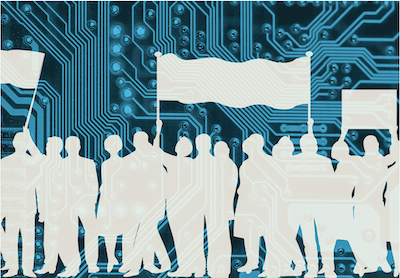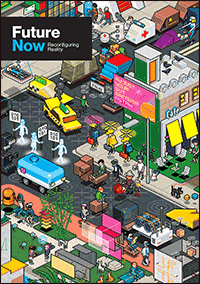Future Now
The IFTF Blog
Universal Basic Assets
Rethinking who owns our digital assets
IFTF’s Executive Director Marina Gorbis spent years exploring and making sense of how technology will transform work and organizations. In her 2013 book The Nature of The Future: Dispatches from the Socialstructed World, Gorbis explored how peer-to-peer production is upending many traditional institutional formats. Since the publication of her book, she has been working with policy makers, civic leaders, and executives to rethink many of our assumptions about the nature of work and organizations.
 In her new work, Gorbis is again pushing boundaries, challenging us to reimagine the social safety net to ensure productivity gains from emerging technologies minimize damaging social outcomes through a concept she calls “universal basic assets.” This extends current discussions around universal basic income to a larger set of assets that everyone should be entitled to as technical advances supercharge productivity. Here are four of Gorbis’ observations about the future of universal basic assets.
In her new work, Gorbis is again pushing boundaries, challenging us to reimagine the social safety net to ensure productivity gains from emerging technologies minimize damaging social outcomes through a concept she calls “universal basic assets.” This extends current discussions around universal basic income to a larger set of assets that everyone should be entitled to as technical advances supercharge productivity. Here are four of Gorbis’ observations about the future of universal basic assets.
1. Over the next decade, we’ll start to see the emergence of machines—such as autonomous cars—that do not simply drive themselves, but manage and monetize themselves. “The problem with that is not so much that it’s a race against the machine, but a race against the institution. Our whole institutional infrastructure is based on the time when everybody worked in large companies, and all of their benefits were tied to that employment.”
2. These factors are transforming the underlying value of assets by “making it possible to produce goods and services in abundance without employing large numbers of workers. As a result, the system that worked relatively well under conditions of scarcity is poorly suited to fulfill the needs of many when products and knowledge can be produced in abundance by relatively few.”
3. These forces are likely to exacerbate current inequalities and destabilize social systems. Even for the wealthy, extreme inequality comes with extreme costs. “Historical research shows that concentration of wealth and power requires investments in vast networks of expensive security institutions leading to what Dr. Rachel Kleinfeld calls ‘privilege violence.’ Some have to build protective bunkers on secluded islands as they prepare for the inevitable social upheavals.”
4. Technological shifts are fundamentally remaking what we can consider to be an asset. “Land was once the primary asset, then it became jobs with benefits. Now, to obtain economic security and prosperity, you also need a whole new class of assets: data, access to AI, and software. Universal basic assets takes into account access to traditional, physical, and financial assets, as well as the growing pools of digital assets. We also need to find new mechanisms for assigning value to activities like caregiving, creative work, and civic engagement that maintain our social fabric but do not currently carry monetary value.”
 FUTURE NOW—Reconfiguring Reality
FUTURE NOW—Reconfiguring Reality
This third volume of Future Now, IFTF's print magazine powered by our Future 50 Partnership, is a maker's guide to the Internet of Actions. Use this issue with its companion map and card game to anticipate possibilities, create opportunities, ward off challenges, and begin acting to reconfigure reality today.
About IFTF's Future 50 Partnership
Every successful strategy begins with an insight about the future and every organization needs the capacity to anticipate the future. The Future 50 is a side-by-side relationship with Institute for the Future: a partnership focused on strategic foresight on a ten-year time horizon. With 50 years of futures research in society, technology, health, the economy, and the environment, we have the perspectives, signals, and tools to make sense of the emerging future.
For More Information
For more information on IFTF's Future 50 Partnership and Tech Futures Lab, contact:
Sean Ness | sness@iftf.org | 650.233.9517



